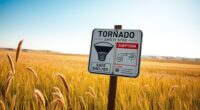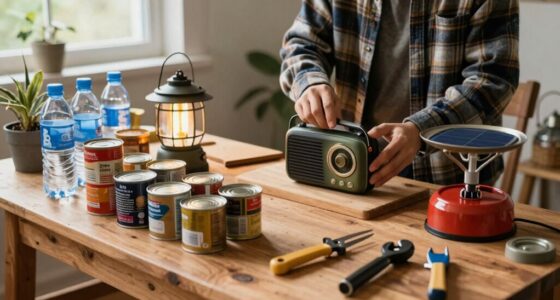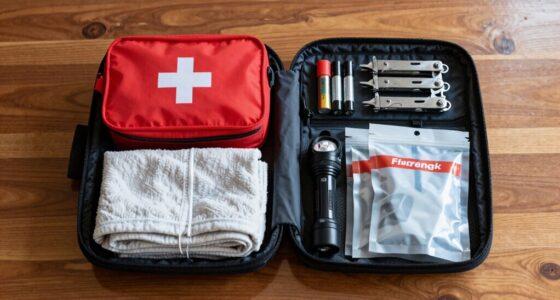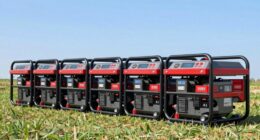An advanced 7-day outage plan guides you through preparing for long-term power and resource disruptions. You’ll assess your household needs, gather supplies, and organize essentials for quick access. It covers securing backup power options like generators and solar, managing food and water, staying safe, and keeping everyone informed. You’ll also learn how to support your wellbeing and plan for recovery once services resume. Continue exploring these steps to build confidence and stay prepared when it matters most.
Key Takeaways
- Prepare by inventorying supplies, securing backup power, and developing clear communication and evacuation plans.
- Store sufficient non-perishable food, clean water, and essential medications, and ensure safety measures like fire prevention.
- Maintain communication with trusted sources, share plans with neighbors, and build community support networks.
- Stay comfortable and healthy through hobbies, hygiene, and managing indoor air quality to boost morale during the outage.
- After the outage, review safety, prioritize repairs, document damages, and update plans for a smooth recovery.
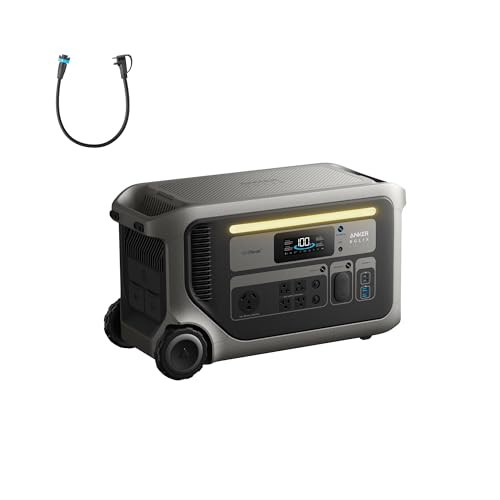
Anker SOLIX F3000 Portable Power Station and Expansion Battery with TT-30 Charging Cable,3,072Wh, 6,000W Recharging, Solar Generators for Home Use, For Power Outages, Camping, RVs, Emergencies
Massive 3,600W Pass-Through Charging: No more interruptions during outages. Recharge with a 120V generator and run appliances at...
As an affiliate, we earn on qualifying purchases.
Assessing Your Needs and Preparing Supplies
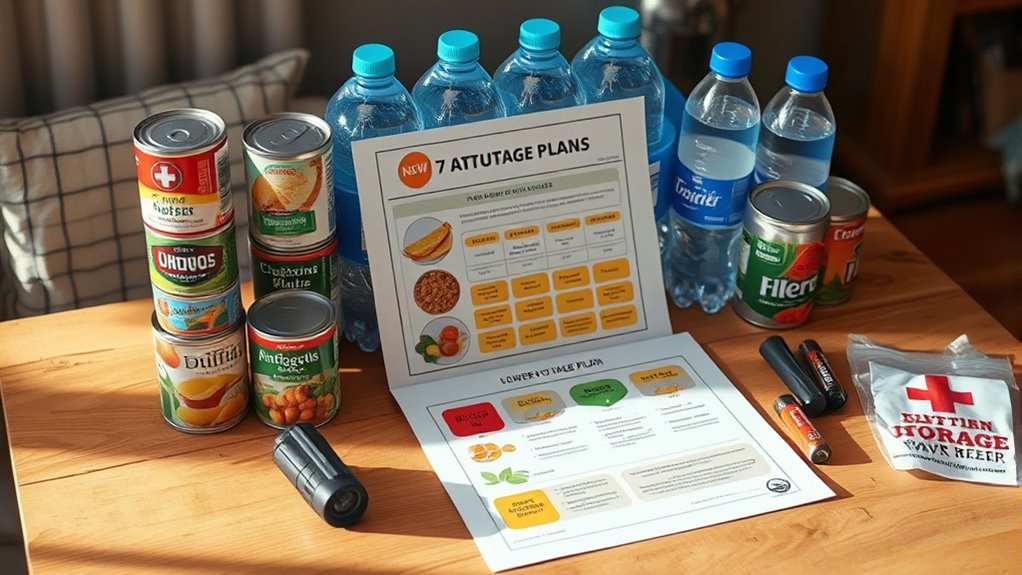
Before a power outage hits, you need to assess your needs and gather essential supplies. Start by reviewing your storage organization to guarantee supplies are easy to locate quickly. Create a resource inventory that includes non-perishable foods, water, batteries, flashlights, and any necessary medications. Consider the specific needs of everyone in your household, including pets. Check expiration dates and replenish items as needed. Organize your supplies in a designated, accessible area so you’re prepared when the outage occurs. Knowing exactly what you have and where it’s stored reduces stress and saves time during an emergency. Proper planning now ensures you won’t waste valuable moments searching for essentials when you need them most. Building a supportive environment can also help family members cope with stressful situations during outages.

Anker SOLIX F3800 Portable Power Station, 3840Wh, LiFePO4 Batteries, Ultra-High 6000W AC Output with 120V/240V, Solar Generator for Home Backup, RVs, Emergencies, Power Outages, and Outdoor Camping
Enlarged Capacity From 3.84kWh: Anker SOLIX F3800 has 3.84kWh to power your family's needs for one day. If...
As an affiliate, we earn on qualifying purchases.
Securing Power Alternatives and Backup Options

To guarantee you can maintain vital functions during a power outage, it’s imperative to secure reliable power alternatives and backup options. Solar power systems are a clean, renewable choice that can keep essential devices running when grid power is down. Investing in portable or home-based solar setups ensures you generate your own electricity without ongoing fuel costs. Additionally, consider generator options; gas, propane, or dual-fuel generators provide immediate, high-capacity backup power. Select a generator sized to meet your critical needs, and ensure you have enough fuel stored safely. Combining solar power with a generator offers flexibility and reliability, so you’re prepared for various outage scenarios. Incorporating battery technologies into your setup can further enhance energy storage and backup capabilities. With these backup options in place, you’ll minimize disruption and safeguard your household’s essential functions.

Anker SOLIX F3000 Portable Power Station with 2×400 Solar Panel, 3,072Wh, 6,000W Recharging, Solar Generators for Home Use, For Power Outages, Camping, RVs, Emergencies
Massive 3,600W Pass-Through Charging: No more interruptions during outages. Recharge with a 120V generator and run appliances at...
As an affiliate, we earn on qualifying purchases.
Managing Food and Water Supplies
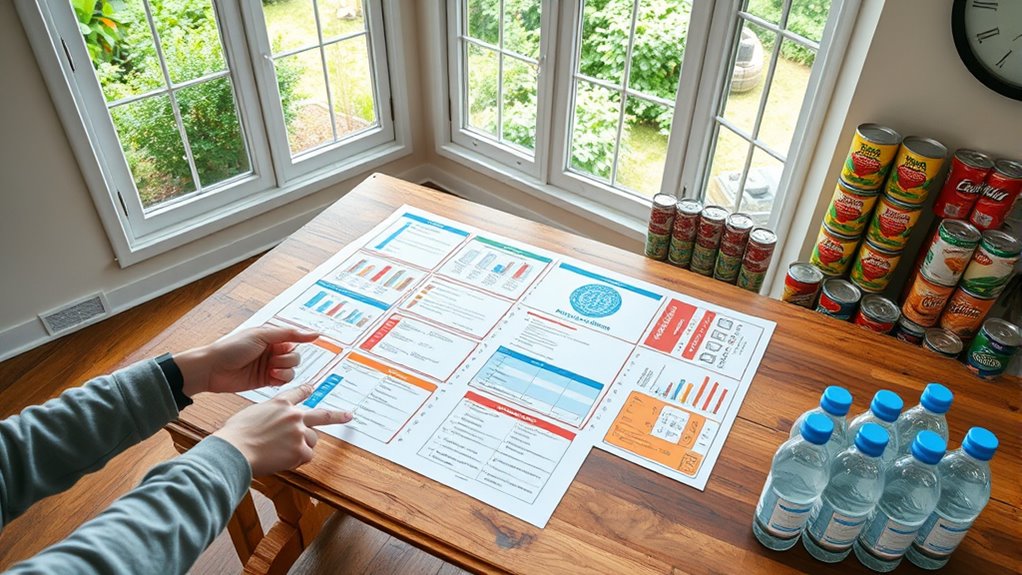
Effective management of food and water supplies is crucial to sustain your household during a prolonged outage. You need to prioritize storing enough non-perishable foods and clean water to meet everyone’s needs. Consider shelter options that include safe water sources and easy access to stored supplies. Keep an eye on medical readiness by having a first aid kit, necessary medications, and hydration solutions available. Proper planning ensures you’re prepared to adapt as conditions change. Regularly monitoring water quality is essential to prevent health issues during an outage.
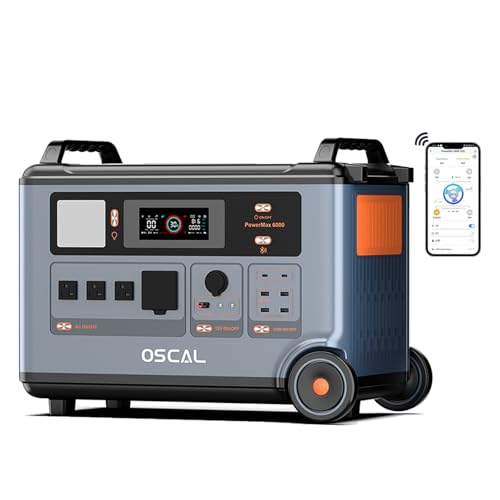
Oscal PowerMax 6000 Portable Power Station 3600Wh LiFePO4 Batteries, 6000W Output (9000W Peak), 5ms UPS, Solar Generator for Home, RVs, Emergencies, Power Outages
High Capacity: Oscal PowerMax6000 3.6kWh to power your family's needs for one day. If that's not enough, add...
As an affiliate, we earn on qualifying purchases.
Ensuring Safety and Staying Informed

Staying safe during a power outage means knowing emergency tips and having a plan in place. Make sure you rely on trusted sources for updates and alerts to avoid misinformation. By staying informed and prepared, you can better protect yourself and your loved ones throughout the outage. Additionally, organizing your important documents and creating a simple, trustworthy plan can help reduce stress and ensure quick access to critical information during emergencies.
Emergency Preparedness Tips
In an emergency, being prepared can make all the difference in keeping yourself safe and informed. To do this, focus on wildfire prevention by clearing brush near your home and having an evacuation plan. Keep your financial preparedness in mind by maintaining a stash of cash and important documents in a safe, accessible place. Stay updated on local alerts and weather conditions through reliable sources. Prepare an emergency kit with water, non-perishable food, and essential supplies. Practice safety drills regularly so you’re ready to act quickly. These steps help minimize risks and ensure you’re ready to handle unexpected events confidently and efficiently. Additionally, understanding community resilience can enhance your ability to recover swiftly from disasters.
Reliable Information Sources
How can you guarantee you’re getting accurate and timely information during an emergency? Start by practicing information verification—cross-check details from multiple trusted sources. Always evaluate your sources carefully; consider their credibility, authority, and recent updates. Rely on official channels like government agencies, local emergency services, and reputable news outlets. Be cautious of social media rumors or unverified reports, which can spread false information. Regularly update your knowledge by monitoring these sources, especially during a crisis. By evaluating your sources and verifying information, you ensure you stay informed with reliable updates. Understanding dream symbols can also help interpret the information you receive. This approach helps you make safe decisions, avoid panic, and respond effectively throughout the outage. Reliable information sources are your key to staying safe and well-informed.
Communicating With Family and Neighbors
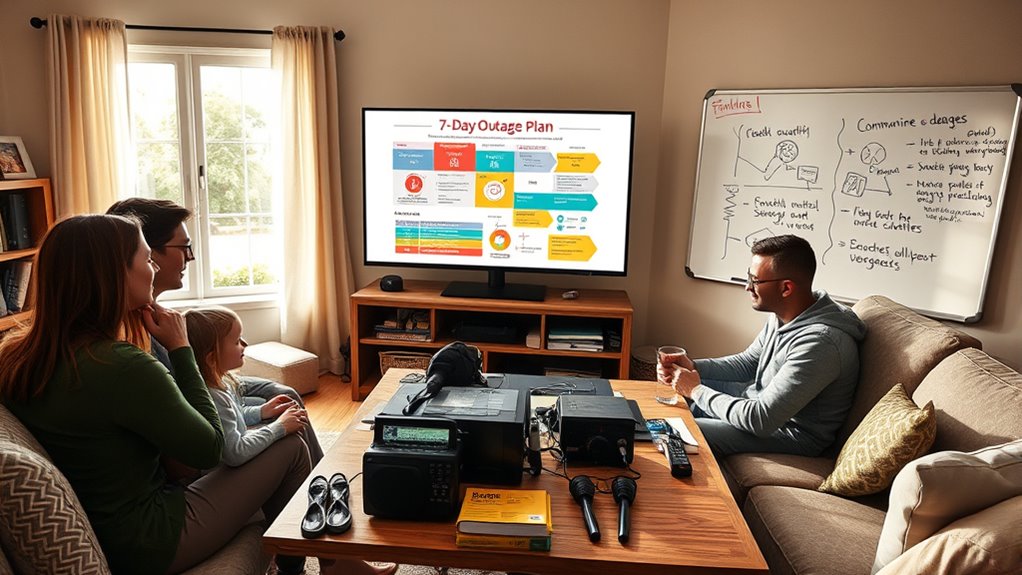
You need to make sure your family and neighbors stay connected during the outage. Share your emergency plans now so everyone knows what to do and how to help each other. Building a strong community support system can make the situation much easier to manage. Considering the importance of clear communication, establishing a projector setup in common areas can also facilitate sharing information visually if needed.
Sharing Emergency Plans
Sharing your emergency plans with family and neighbors guarantees everyone knows what to do if disaster strikes. Clear communication ensures coordinated actions, like evacuation procedures, and helps prevent confusion. When you share your plan, discuss key details such as meeting points, emergency contacts, and resource locations. Include your financial planning strategies, like keeping cash accessible or safeguarding important documents. Make sure everyone understands their roles and responsibilities during a crisis. This openness fosters trust and enables quick, effective responses. Additionally, sharing your plans encourages neighbors to do the same, creating a supportive network. By openly discussing these details, you reduce panic and improve safety for everyone involved. Remember, preparedness is a team effort that can save lives during a 7-day outage. Being aware of caffeine content in common foods can also be useful if energy levels need managing during extended outages.
Building Community Support
Building community support begins with open communication among family members and neighbors. When you share your outage plans, you encourage community engagement, which helps everyone stay informed and prepared. Talk about potential needs, resources, and how you can support each other during the outage. Establishing volunteer coordination ensures that tasks like checking on vulnerable neighbors or sharing supplies are organized and efficient. By fostering trust and collaboration, you create a resilient network that can handle challenges more effectively. Keep communication channels open, such as group chats or neighborhood meetings, to strengthen relationships and coordinate efforts. Building this support system not only eases individual worries but also creates a unified front that can better withstand the disruptions of a prolonged outage. As a Best Vacuum Expert, I also recommend maintaining a clean environment to reduce allergens and dust that can complicate health issues during stressful times.
Maintaining Comfort and Morale
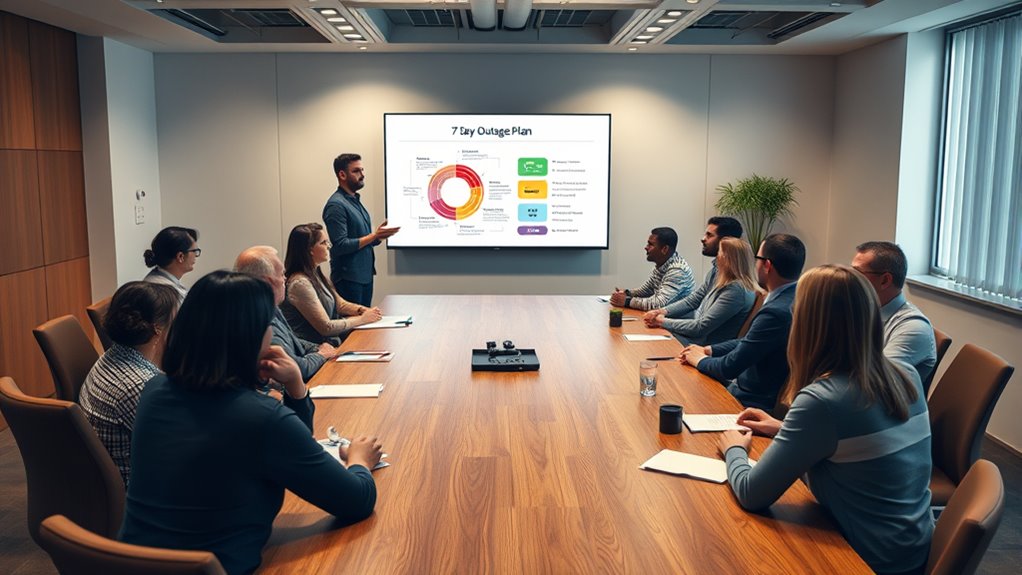
How can you keep spirits high and comfort levels steady during a prolonged outage? The key is to focus on hobbies, relaxation, and entertainment options that boost morale. Engage in simple activities like reading, puzzles, or arts and crafts to stay occupied. Make sure everyone has comfortable, warm spaces and access to basic needs. Sharing stories and staying connected helps maintain a positive atmosphere. Incorporating clutter management strategies can also help reduce stress and create a more calming environment during an outage.
Planning for the End of the Outage and Recovery

As the outage nears its end, it’s vital to prepare for a smooth recovery and restore normalcy quickly. Review your evacuation procedures to verify everyone knows the steps if further action is needed. Confirm that all safety measures are in place and that any remaining risks are managed. Simultaneously, focus on your financial planning to cover unexpected expenses that may arise during recovery. Reassess your budget, prioritize essential repairs, and identify sources of emergency funds. Communicate clearly with your team or family about upcoming actions and financial needs. By planning ahead for the end of the outage, you’ll minimize chaos, expedite restoration, and return to normal faster. Staying organized now helps you handle the transition efficiently and confidently.
Frequently Asked Questions
How Do I Prioritize Tasks During a Power Outage?
During a power outage, you should prioritize tasks that guarantee safety first, like checking emergency communication devices and following safety procedures. Next, secure essential needs such as food, water, and medical supplies. Avoid unnecessary activities, and communicate with others to stay informed. Focus on maintaining safety and health, then move on to less critical tasks. Always stay updated with official notices and follow safety protocols to protect yourself and your loved ones.
What Are Cost-Effective Backup Power Options?
Think of your backup power as a trusty sidekick in a storm. You can opt for affordable generator options like portable gas generators, or harness the sun with solar power setups, which are increasingly cost-effective. Solar panels reduce ongoing costs, while generators provide immediate backup. Both choices help you stay connected without breaking the bank, ensuring your home stays powered during outages without overspending.
How Can I Prevent Food Spoilage Without Refrigeration?
You can prevent food spoilage without refrigeration by using food preservation techniques like curing, drying, or fermenting. Non-electric cooling methods such as root cellars or underground storage help maintain cool temperatures naturally. Store perishables in cool, dark places, and keep them covered to reduce exposure to air and pests. These strategies extend freshness, especially during outages, ensuring your food stays safe and edible longer.
What Legal Considerations Exist for Emergency Preparedness?
You need to guarantee your emergency preparedness plans meet legal standards by considering insurance liabilities and regulatory compliance. Verify that your plans adhere to local and federal regulations, and document all safety procedures. This way, you reduce legal risks and protect your assets. Regularly review and update your plans, and consult legal experts to stay compliant. Staying proactive helps you avoid liabilities and ensures you’re prepared for any emergency situation.
How Do I Handle Medical Needs During an Outage?
When facing a power outage, you better have your medical supplies ready and emergency contacts on speed dial—because life doesn’t pause for blackouts. Stock up on essentials like medications, batteries, and first aid items. Keep a list of emergency contacts handy, including your healthcare provider. Remember, a little prep today keeps the chaos at bay tomorrow—unless you enjoy improvising with your meds, in which case, good luck!
Conclusion
Think of your outage plan like a sturdy lifeboat in a storm—you’ll feel more secure knowing you’re prepared. When I faced a week-long blackout, having supplies and a communication plan kept my family calm and safe. Remember, a little prep today can turn chaos into calm tomorrow. Stay proactive, stay connected, and you’ll navigate any outage with confidence—like steering a well-equipped boat through rough waters.

